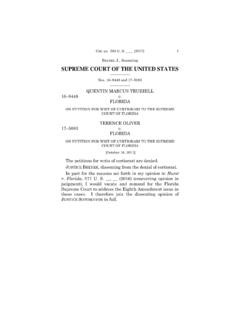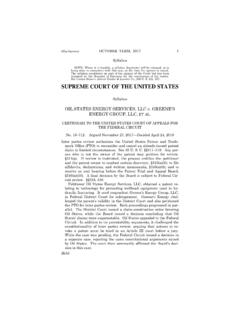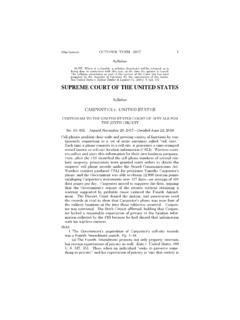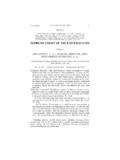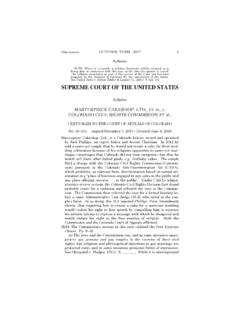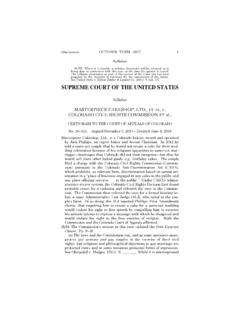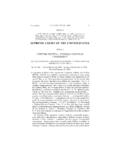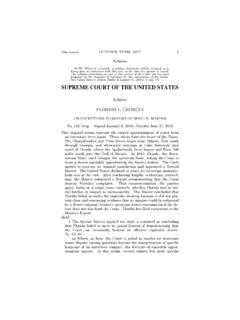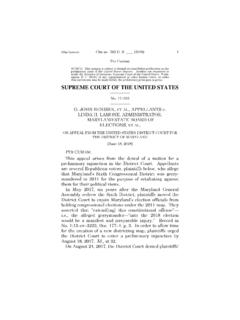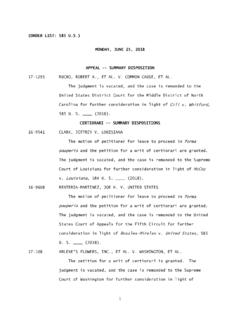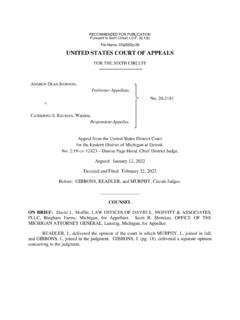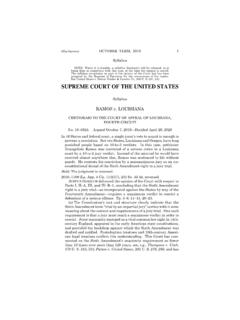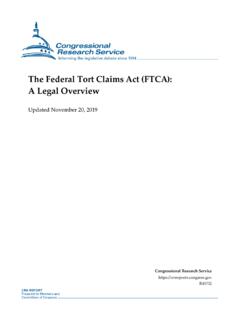Transcription of SUPREME COURT OF THE UNITED STATES
1 (Slip Opinion) OCTOBER TERM, 2021 1. Syllabus NOTE: Where it is feasible, a syllabus (headnote) will be released, as is being done in connection with this case, at the time the opinion is issued. The syllabus constitutes no part of the opinion of the COURT but has been prepared by the Reporter of Decisions for the convenience of the reader. See UNITED STATES v. Detroit Timber & Lumber Co., 200 U. S. 321, 337. SUPREME COURT OF THE UNITED STATES . Syllabus UNITED STATES v. HUSAYN, AKA ZUBAYDAH, ET AL. CERTIORARI TO THE UNITED STATES COURT OF APPEALS FOR. THE NINTH CIRCUIT. No. 20 827. Argued October 6, 2021 Decided March 3, 2022. In the aftermath of the September 11, 2001, terrorist attacks, the Cen- tral Intelligence Agency believed that Abu Zubaydah was a senior al Qaeda lieutenant likely to possess knowledge of future attacks against the UNITED STATES .
2 Zubaydah currently a detainee at the Guant - namo Bay Naval Base says that in 2002 and 2003 he was held at a CIA detention site in Poland, where he was subjected to enhanced in- terrogation techniques. In 2010, Zubaydah filed a criminal complaint in Poland, seeking to hold accountable any Polish nationals involved in his alleged mistreatment at the CIA site ostensibly located in that country. The UNITED STATES denied multiple requests by Polish prose- cutors for information related to Zubaydah's claim on the ground that providing such information would threaten national security. Zubaydah filed a discovery application pursuant to 28 U. S. C. 1782, which permits district courts to order production of testimony or docu- ments for use in a proceeding in a foreign.
3 Tribunal. Zubaydah asked for permission to serve two former CIA contractors with subpoe- nas requesting information regarding the alleged CIA detention facil- ity in Poland and Zubaydah's treatment there. The Government inter- vened and asserted the state secrets privilege in opposition to Zubaydah's discovery request. The District COURT rejected the Government's claim that merely con- firming that a detention site was operated in Poland would threaten national security. The District COURT nevertheless dismissed Zubaydah's discovery application. It concluded that the state secrets privilege applied to operational details concerning the CIA's coopera- tion with a foreign government, and that meaningful discovery could not proceed without disclosing privileged information.
4 On appeal, the 2 UNITED STATES v. ZUBAYDAH. Syllabus Ninth Circuit agreed with the District COURT that much of the infor- mation sought by Zubaydah was protected from disclosure by the state secrets privilege, but the panel majority concluded that the District COURT had erred when it dismissed the case. It believed that the state secrets privilege did not apply to publicly known information. The panel majority also concluded that because the CIA contractors were private parties and not Government agents, they could not confirm or deny anything on the Government's behalf. Given these holdings, the panel majority determined that discovery into three topics could con- tinue: the existence of a CIA detention facility in Poland, the conditions of confinement and interrogation at that facility, and Zubaydah's treat- ment at that location.
5 Held: The judgment is reversed, and the case is remanded. 938 F. 3d 1123, reversed and remanded. JUSTICE BREYER delivered the opinion of the COURT with respect to all but Parts II B 2 and III, concluding that, in the context of Zubaydah's 1782 discovery application, the COURT of Appeals erred in holding that the state secrets privilege did not apply to information that could confirm or deny the existence of a CIA detention site in Po- land. Pp. 7 13, 14 15, 18. (a) The state secrets privilege permits the Government to prevent disclosure of information when that disclosure would harm national security interests. UNITED STATES v. Reynolds, 345 U. S. 1, 10 11. To assert the privilege, the Government must submit to the COURT a for- mal claim of privilege, lodged by the head of the department which has control over the matter.
6 Id., at 7 8. The COURT itself must determine whether the circumstances are appropriate for the claim of privilege.. Id., at 8. However, in making that determination, a COURT should ex- ercise its traditional reluctan[ce] to intrude upon the authority of the Executive in military and national security affairs, Department of Navy v. Egan, 484 U. S. 518, 530. If the Government has offered a valid reason for invoking the privilege, the showing of necessity by the party seeking disclosure of the ostensibly privileged information will determine how far the COURT should probe in satisfying itself that the occasion for invoking the privilege is appropriate. Reynolds, 345. U. S., at 11. The narrow evidentiary dispute before the COURT asks how these principles apply to Zubaydah's specific discovery requests.
7 Pp. 7 9. (b) In certain circumstances, the Government may assert the state secrets privilege to bar the confirmation or denial of information that has entered the public domain through unofficial sources. Here, the information held by the Ninth Circuit to be nonprivileged would nec- essarily tend to confirm (or deny) that the CIA maintained a detention site in Poland. The Government has shown that such information . Cite as: 595 U. S. ____ (2022) 3. Syllabus even if already made public through unofficial sources could signifi- cantly harm national security. The CIA Director stated in his declara- tion that clandestine relationships with foreign intelligence services are critical and based on mutual trust that the classified existence and nature of the relationship will not be disclosed.
8 App. to Pet. for Cert. 135a 136a. Given the nature of Zubaydah's specific discovery requests there is a reasonable danger that in this case a former CIA. insider's confirmation of confidential cooperation between the CIA and a foreign intelligence service could badly damage the CIA's clandestine relationships with foreign authorities. Pp. 9 13. (c) The CIA contractors' confirmation (or denial) of the information Zubaydah seeks would be tantamount to disclosure by the CIA itself. The contractors worked directly for the CIA and had a central role in the events in question. The CIA Director describes the harm that would result from the contractors responding to the subpoenas, not the risks of a response from the CIA (or any other CIA official or employee).
9 Pp. 14 15. (d) Zubaydah's need for location information is not great, perhaps close to nonexistent. At oral argument, he suggested that he did not seek confirmation of the detention site's Polish location so much as he sought information about what had happened there. P. 15. (e) Here, the state secrets privilege applies to the existence (or non- existence) of a CIA facility in Poland, and therefore precludes further discovery into all three categories of information the Ninth Circuit con- cluded to be nonprivileged. P. 15. (f) This case is remanded with instructions to dismiss Zubaydah's current application for discovery under 1782. P. 18. BREYER, J., delivered the opinion of the COURT , except as to Parts II.
10 B 2 and III. ROBERTS, C. J., joined that opinion in full, KAVANAUGH and BARRETT, JJ., joined as to all but Part II B 2, KAGAN, J., joined as to all but Parts III and IV and the judgment of dismissal, and THOMAS and ALITO, JJ., joined Part IV. THOMAS, J., filed an opinion concurring in part and concurring in the judgment, in which ALITO, J., joined. KA- VANAUGH, J., filed an opinion concurring in part, in which BARRETT, J., joined. KAGAN, J., filed an opinion concurring in part and dissenting in part. GORSUCH, J., filed a dissenting opinion, in which SOTOMAYOR, J., joined. Cite as: 595 U. S. ____ (2022) 1. Opinion of the COURT NOTICE: This opinion is subject to formal revision before publication in the preliminary print of the UNITED STATES Reports.
